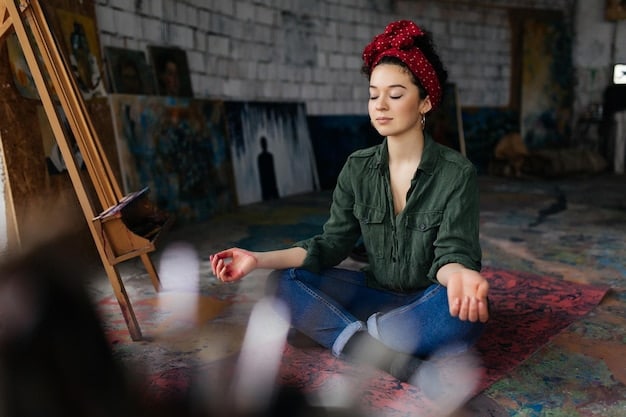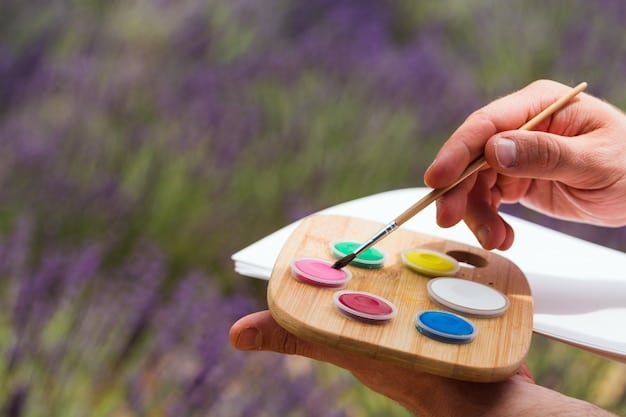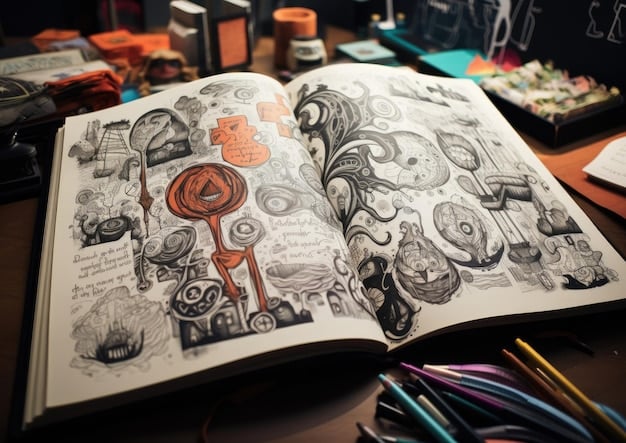Zen and Creativity: Mindfulness for Artistic Expression

Zen and Creativity explores how mindfulness principles can unlock your inner artist, fostering a more profound and expressive connection with your creative potential by cultivating a focused, present, and non-judgmental approach to artistic endeavors.
Discover the powerful synergy between Zen and Creativity: Unleashing Your Inner Artist Through Mindfulness. By integrating Zen principles into your artistic practice, you can unlock new levels of inspiration, focus, and self-expression, transforming both your art and your life.
The Essence of Zen and Its Connection to Creativity
Zen Buddhism, with its emphasis on mindfulness and meditation, offers a unique pathway to enhance creativity. Understanding the core principles of Zen can illuminate how it fosters a state of mind conducive to artistic expression, helping you tap into your creative potential with greater ease and depth.
Let’s delve into the fundamental aspects of Zen and how they naturally align with and nurture the creative process.
Mindfulness: The Foundation of Zen Creativity
Mindfulness is the practice of paying attention to the present moment without judgment. In the context of art, it allows you to fully immerse yourself in the creative process, noticing details and nuances that might otherwise be missed.
Non-Judgment: Unleashing Creative Freedom
Zen emphasizes non-judgment, which is crucial for overcoming creative blocks and self-criticism. By adopting a non-judgmental attitude towards your work, you can experiment freely, take risks, and embrace imperfections as part of the creative journey.

Here are some ways mindfulness and non-judgment can enhance your creative journey:
- Increased Focus: Mindfulness sharpens your attention, allowing you to concentrate deeply on your art.
- Reduced Anxiety: Zen practices help calm the mind, reducing anxiety and stress that can stifle creativity.
- Enhanced Intuition: By being present, you become more attuned to your intuition and inner guidance.
- Greater Appreciation: Mindfulness allows you to appreciate the beauty and wonder in the world around you, fueling inspiration.
In summary, Zen’s emphasis on mindfulness and non-judgment can significantly enhance the creative process by fostering a focused, calm, and open state of mind. This allows artists to connect more deeply with their work, overcome creative blocks, and express themselves with greater authenticity.
Meditation Techniques for Creative Inspiration
Zen meditation techniques are powerful tools for unlocking creative inspiration. By incorporating these practices into your routine, you can cultivate a mind that is more open, receptive, and attuned to creative insights.
Let’s explore specific meditation techniques and how they can stimulate your artistic expression.
Zazen: The Heart of Zen Meditation
Zazen, or seated meditation, is a core practice in Zen Buddhism. It involves sitting in a specific posture with a straight back, focusing on the breath, and allowing thoughts to pass without judgment. This practice cultivates stillness and clarity, creating space for creative ideas to emerge.
Walking Meditation: Finding Creativity in Motion
Walking meditation involves mindfully walking at a slow pace, paying attention to the sensations of your feet making contact with the ground. This practice can be particularly helpful for breaking through creative blocks, as it combines physical movement with mental focus.
Here’s how to integrate these meditation techniques into your creative process:
- Establish a Routine: Dedicate a specific time each day for meditation, even if it’s just for 10-15 minutes.
- Create a Quiet Space: Find a quiet and comfortable place where you can meditate without distractions.
- Focus on Your Breath: Pay attention to the sensation of your breath entering and leaving your body.
- Observe Your Thoughts: Acknowledge thoughts as they arise, but don’t get carried away by them.
In conclusion, Zen meditation techniques such as Zazen and walking meditation can provide a powerful boost to creative inspiration. By developing a consistent meditation practice, you can cultivate a mind that is more open, receptive, and attuned to the flow of creative ideas.
Cultivating a Beginner’s Mind in Your Art
The concept of “beginner’s mind,” or shoshin, is central to Zen practice and profoundly impacts creativity. Approaching your art with a beginner’s mind means seeing the world with fresh eyes, free from preconceived notions and expectations.
This openness can lead to unexpected discoveries and breakthroughs in your artistic expression.
Embracing Uncertainty: A Key to Creative Growth
A beginner’s mind embraces uncertainty and the unknown. It allows you to experiment without fear of failure, knowing that every attempt, regardless of the outcome, is a learning opportunity.
Letting Go of Expectations: Discovering New Possibilities
When you let go of expectations, you open yourself up to new possibilities. You become more receptive to unexpected insights and creative solutions that might otherwise be overlooked.

Here are some practices to cultivate a beginner’s mind in your art:
- Try New Mediums: Experiment with different art supplies and techniques.
- Challenge Your Assumptions: Question your beliefs about what art “should” be.
- Embrace Mistakes: View mistakes as opportunities for learning and growth.
- Stay Curious: Maintain a sense of wonder and curiosity about the world around you.
In essence, cultivating a beginner’s mind is essential for fostering creativity. By approaching your art with openness, curiosity, and a willingness to embrace the unknown, you can unlock new levels of innovation and self-expression.
Overcoming Creative Blocks with Zen Principles
Creative blocks are a common challenge for artists, but Zen principles offer effective strategies for overcoming these obstacles. By applying mindfulness, non-judgment, and acceptance, you can navigate creative blocks with greater ease and resilience.
Let’s discuss how Zen can help you break through the barriers that hinder your creativity.
Mindfulness for Identifying the Root Cause
Mindfulness allows you to observe your thoughts and emotions without judgment, helping you identify the underlying causes of your creative block. Are you feeling anxious about meeting expectations? Are you being too critical of your work?
Non-Judgment for Releasing Self-Criticism
Non-judgment is essential for releasing self-criticism, which is often a major contributor to creative blocks. By accepting your imperfections and focusing on the process rather than the outcome, you can free yourself from paralyzing self-doubt.
Here are some Zen-inspired techniques for overcoming creative blocks:
- Take a Break: Step away from your work and engage in a relaxing activity, such as a walk in nature.
- Meditate: Practice mindfulness meditation to calm your mind and gain clarity.
- Journal: Write down your thoughts and feelings to gain insight into your creative block.
- Experiment: Try a new approach or technique to break out of your routine.
In summary, Zen principles provide valuable tools for overcoming creative blocks. By practicing mindfulness, non-judgment, and acceptance, you can identify the root causes of your blocks, release self-criticism, and regain your creative momentum.
Finding Flow State Through Zen Practices
The “flow state” is a state of complete immersion and engagement in an activity, characterized by heightened focus, enjoyment, and a sense of effortless action. Zen practices are highly effective for cultivating flow state in your creative work.
Understanding how Zen facilitates flow can transform your artistic experience.
Focus and Concentration: Essential for Flow
Zen meditation techniques train your mind to focus and concentrate, which are essential for entering flow state. By quieting the mental chatter and directing your attention to the task at hand, you can become fully absorbed in your creative work.
Present Moment Awareness: Deepening the Flow Experience
The present moment awareness cultivated through Zen practice deepens the flow experience. When you are fully present, you become more attuned to the nuances of your work, allowing you to respond intuitively and creatively.
Here are some ways to enhance flow state through Zen:
- Minimize Distractions: Create a quiet and uncluttered workspace.
- Set Clear Goals: Define specific objectives for each creative session.
- Challenge Yourself: Choose tasks that are challenging but not overwhelming.
- Trust Your Intuition: Allow yourself to be guided by your inner wisdom.
In conclusion, Zen practices provide a direct pathway to finding flow state in your creative work. By cultivating focus, present moment awareness, and a sense of effortless action, you can unlock new levels of creativity, enjoyment, and fulfillment.
Integrating Zen into Your Daily Creative Routine
Integrating Zen principles into your daily creative routine can transform your artistic practice into a mindful and enriching experience. By incorporating Zen practices into your daily life, you can cultivate a deeper connection with your art and yourself.
Let’s explore ways to make Zen a part of your creative process.
Mindful Observation: Gathering Inspiration
Start your day by practicing mindful observation. Take a few moments to observe your surroundings with curiosity and attention. Notice the details of the light, the colors, and the shapes around you. This practice can spark new ideas and inspire your creative work.
Mindful Creation: Engaging with Your Art
When you sit down to create, approach your work with mindfulness. Pay attention to the sensations of your body, the thoughts in your mind, and the emotions that arise. Allow yourself to be fully present with your art, without judgment or expectation.
Here are some additional ways to integrate Zen into your creative routine:
- Practice Gratitude: Take a moment each day to appreciate the beauty and wonder in your life.
- Simplify Your Space: Create a clean and uncluttered workspace that promotes focus and calm.
- Connect with Nature: Spend time outdoors, immersing yourself in the natural world.
- Be Patient: Allow your creative process to unfold naturally, without rushing or forcing it.
In essence, integrating Zen into your daily creative routine can transform your artistic practice into a mindful and enriching experience. By approaching your art with presence, openness, and gratitude, you can cultivate a deeper connection with your creativity and yourself.
The Transformative Power of Zen and Creativity
The transformative power of Zen and Creativity: Unleashing Your Inner Artist Through Mindfulness extends beyond the canvas or the written page. It profoundly impacts your overall well-being, fostering a sense of peace, joy, and fulfillment that permeates every aspect of your life.
Let’s explore the broader benefits of integrating Zen into your creative journey.
Enhanced Self-Awareness: Understanding Your Creative Process
Zen practices cultivate self-awareness, allowing you to understand your creative process more deeply. You become more attuned to your strengths, weaknesses, and patterns, enabling you to make more conscious choices about your art.
Increased Resilience: Navigating the Ups and Downs
Zen principles foster resilience, helping you navigate the ups and downs of the creative journey with greater equanimity. You learn to accept setbacks and challenges as opportunities for growth, rather than allowing them to derail your progress.
Here are some of the transformative benefits of combining Zen and creativity:
- Reduced Stress: Zen practices help calm the mind and reduce stress, creating a more peaceful and balanced life.
- Enhanced Emotional Well-Being: By connecting with your inner self, you can cultivate a greater sense of emotional well-being.
- Increased Creativity: Zen practices unlock new levels of creativity and inspiration.
- Deeper Sense of Purpose: By aligning your art with your values, you can create a life that is filled with meaning and purpose.
In conclusion, the transformative power of Zen and creativity extends far beyond the realm of art. By integrating Zen principles into your creative practice, you can cultivate a more mindful, resilient, and fulfilling life. This holistic approach not only enhances your artistic expression but also nurtures your overall well-being, leading to a life of greater peace, joy, and purpose.
| Key Point | Brief Description |
|---|---|
| 🧘 Mindfulness | Focusing on the present moment enhances creative immersion. |
| 🚫 Non-Judgment | Releasing self-criticism fosters creative freedom and experimentation. |
| 🧠 Beginner’s Mind | Approaching art with openness leads to unexpected discoveries. |
| ✨ Flow State | Zen practices help achieve a state of complete creative absorption. |
Frequently Asked Questions
▼
Zen enhances creativity by promoting mindfulness, reducing stress, and fostering a non-judgmental approach. These elements help artists connect more deeply with their work and unlock new inspiration.
▼
Zazen (seated meditation) and walking meditation are excellent for artists. These practices cultivate stillness and focus, allowing creative ideas to emerge more freely.
▼
To overcome creative blocks, use mindfulness to identify the root cause, practice non-judgment to release self-criticism, and take breaks to refresh your mind. Experiment with new approaches and techniques.
▼
“Beginner’s mind” (shoshin) is an attitude of openness and curiosity, free from preconceived notions. It allows you to approach your art with fresh eyes, leading to unexpected discoveries and creative growth.
▼
Integrate Zen by starting with mindful observation, practicing gratitude, simplifying your workspace, and connecting with nature. Approach your art with presence and patience to foster a deeper connection.
Conclusion
By embracing the principles of Zen and Creativity: Unleashing Your Inner Artist Through Mindfulness**, you can unlock your full creative potential and experience a more profound connection with your art and yourself. Incorporate these practices into your daily routine to cultivate a mindful, resilient, and fulfilling creative journey.





